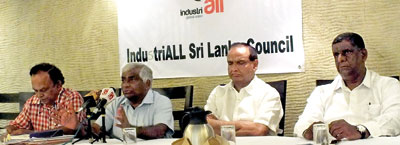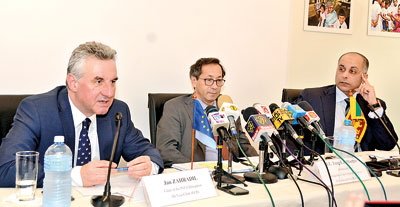Democracy working in Sri Lanka: EU delegation
The No-Confidence motion that was debated in parliament on Wednesday proved that democracy is working in Sri Lanka, observed the European Parliamentary Delegation visiting Sri Lanka at the media briefing held at the Office of the Delegation of the European Union to Sri Lanka and the Maldives in Colombo on Thursday.

Anton Marcus, Joint Secretary, Free Trade Zones & General Services Employees Union (second left) addressing the media briefing on GSP +. Others in the picture are from left: Sylvester Jayakody - Gen Secretary, Ceylon Mercantile Union, Palitha Atukorale, Secretary - Industiall Sri Lanka Council and Padmasiri Ranawakaaarachchi, Secretary General, National Trade Union Federation. Pic by Quintus Perera.
A delegation of six members of the European Parliament Committee on International Trade (INTA) were in Sri Lanka from April 4 to 6 to follow up on the country’s commitments made in exchange for access to the European Union (EU).
Jan Zahradil, European Conservatives and Reformists at the media briefing, said that that they have been able to see democracy at work in Sri Lanka referring to the recent No-Confidence vote in parliament and indicated that this is a very good example of a real democracy. He said “for us it was a very good example of a vibrant democracy.”
Meanwhile on the same day morning, trade union leaders in the IndustriALL Sri Lanka Council meeting the media at Renuka Hotel, Colombo indicated that while the EU has granted GSP+ which accrues benefits to Sri Lanka these benefits are reaped by the employers of the Free Trade Zones. They are getting increased orders for garments, trade union leaders said, adding that 50 per cent of these benefits should trickle down to the workers and the public.
At the EU briefing, Mr. Zahradil said that they came here to share some of their findings and observations made by INTA and said that they had several meetings with officials, Ministers of Law and Order, Labour and the Speaker of the House as well as the Leader of the Opposition and had met the Prime Minister too. They have also met TU leaders, NGOs, and missions of ILO and UN in Colombo.
They were discussing issues related to GSP + which they believed is beneficial to both Sri Lanka and the EU countries and were keen to cooperate with Sri Lankan partners. It was persistently stressed by Mr. Zahradil that they were not here to master, teach nor scrutinise but as friends in a united journey to work for a better Sri Lanka and its people. He said that they are interested in the security of the country as it is important for the overseas investors to see a stable country.
Also speaking about GSP +, he said: “If necessary we like to speak little bit about labour market and most of these things are domestic. And we are interested in particular about some labour conventions of international standards. But everything is in a positive, active way. So again, happy to be here.”
Sajjad H. Karim, Standing Rapportuer, European Conservatives and Reformists said that while Sri Lanka needs to raise its standards, he felt that the people themselves wanted their living standards to improve and was keen to strengthen the relations between them and Sri Lanka.

From left: Zahradil - European Conservatives and Reformists, Tung-Laï Margue - EU Ambassador in Sri Lanka and Sajjad H Karim, Standing Rapportuer, European Conservatives and Reformists. Pic by M.D. Nissaka.
They were discussing about the Prevention of Terrorism Act and Counter Terrorism Act and inquired whether Sri Lanka would adhere to international standards for good and equitable law enforcement. He pointed out: “We demand nothing, but merely a journey undertaken as partners in order to ultimately arrive at a place of a strong, open, vibrant, tolerant Sri Lanka that provides opportunity for its citizens and raising their living standards”.
Referring to the recent communal disturbances in Kandy, he said they were not satisfied about the protection afforded to those attacked and there was nervousness among the minority groups while pointing to a need for the government to improve policing and good community relations.
At the Renuka Hotel media briefing by trade unionists, Anton Marcus, Joint Secretary, Free Trade Zones & General Services Employees Union said that even before granting GSP + last year they were campaigning and canvassing and have played a major role to obtain this facility. He said that they are joining the EU delegates in their task of assessing the working of GSP +. They also have discussed other labour issues affecting the workers.
He pointed out that the employers refuse to accept that GSP + afforded financial benefits but Mr. Marcus insisted that all involved should work out to at least 50 per cent of these benefits being shared among the workers and the public.
Unions oppose changing May Day
Another matter of concern raised by unions at the briefing was the government decision to change the date of holding the May Day which has become a major issue among the trade unions.
Sylvester Jayakody, General Secretary, Ceylon Mercantile Union (CMU) said that changing the date of May Day is like changing one’s birthday and they have with all other trade unions decided to hold the May Day on May 1.
Mr. Marcus said that they are holding their May Day on May 1 in Vavuniya in a bid to bridge North and South through workers.
Another plague that erodes the working class is the ‘manpower’ employment system, pointed out Palitha Athukorale, Secretary, Industriall Sri Lanka Council, adding that 40 per cent of the 8 million workforce in the country consist of manpower employees and their future is destroyed as they would not receive any benefit like the permanent workers.
He said that every day in the morning at Awariwatte, Katunayake there would be more than 1,000 girls herded, worse than cattle, into lorries and transported to factories. The contractors are said to be hooligans in the area with political connections. He pointed out that many unpleasant incidents appear to be happening during this transportation.


